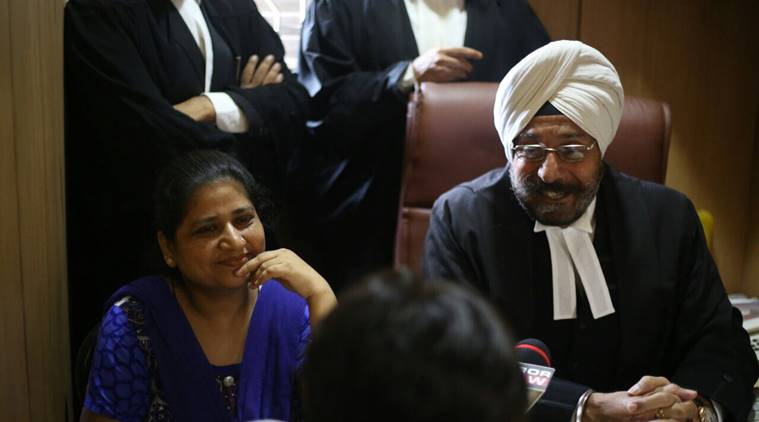by BRINDA KARAT
 Main plaintiff Shayara Bano with her counsel Amit Singh Chadha after the historic verdict on the practice of triple talaq by the Supreme Court in New Delhi on August 22, 2017. PHOTO/Tashi Tobgyal/The Indian Express
Main plaintiff Shayara Bano with her counsel Amit Singh Chadha after the historic verdict on the practice of triple talaq by the Supreme Court in New Delhi on August 22, 2017. PHOTO/Tashi Tobgyal/The Indian Express
The 395-page judgement of the Supreme Court on the triple talaq issue ends with a short order: ” In view of the different opinions recorded, by a majority of 3:2 the practice of talaq-e-bidat – triple talaq is set aside.” It is signed by all the five judges involved, namely Jagdish Singh Khehar (Chief Justice), Kurian Joseph, Rohinton Fali Nariman, Uday Umesh Lalit and S. Abdul Nazeer.
The arguments are extensive and will require further reading and study, and he three judges who gave the majority judgement reached the same conclusion, though on different grounds. But it can be unambiguously stated that the majority judgement is most welcome and is a significant step forward for women’s rights.
This order constitutes a victory for the secular struggle for women’s rights. Any judgement which enhances the rights of women of one community certainly impacts positively on all women. Muslim women have been in the forefront of the struggle against what they consider a patriarchal misinterpretation of Koranic tenets such as the talaq-e-bidat form of divorce which is instant and arbitrary, and all credit to their struggle and that of democratic women’s organisations like AIDWA who took up this issue many decades ago and campaigned in a sustained manner among Muslim women.
In the face of the struggle of Muslim women, the Muslim Law Board was forced to change its stand. It had to shift from its utterly reprehensible and objectionable first affidavit which demeaned women and glorified male supremacist arguments. Its last affidavit agreed that the practice was “sinful” and it pledged to prevent its use. The affidavit stated, “At the time of performing Nikkah (marriage), the person performing the Nikkah will advise the bridegroom/man that in case of differences leading to talaq, (he) shall not pronounce three divorces in one sitting since it is an undesirable practice in Shariat.” Even if this was just a last ditch attempt to prevent an adverse court verdict, its position is there on record. It would be in the best interests of the Board to accept the court verdict and to cooperate in its implementation.
The reactions of BJP leaders are amusing, hailing it as their victory. It is nothing of the sort. The court has maintained a fine balance between the protection for personal laws granted by the constitution and judicial intervention. In the majority judgement too, the judgement is careful to point out that it is related to only one type of triple talaq, talaq-e-bidat, which it found arbitrary and not intrinsic to Koranic tenets. It did not accept the efforts and arguments of the Attorney General representing the central government to widen the scope of the court intervention to other aspects of divorce under Muslim personal law. The efforts to bring in arguments in favour of the Uniform Civil Code were also not taken into consideration by the Court. In fact, the Chief Justice of India made a specific mention of the arguments of the Attorney General and made an implicit warning against a “cascading effect.” He spoke specifically about the contention of the Attorney General that “all forms of talaq suffered from the same infirmities as have been expressed as talaq-e-bidat”.
NDTV for more